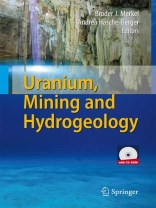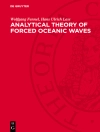Subject of the book is Uranium and its migration in aquatic environments. The following subjects are emphasised: Uranium mining, Phosphate mining, mine closure and remediation, Uranium in groundwater and in bedrock, biogeochemistry of Uranium, environmental behavior, and modeling. Particular results from the leading edge of international research are presented.
Jadual kandungan
Uranium ISL Mining Activities at the International Atomic Energy Agency.- Uranium mining legacies remediation and renaissance development: an international overview.- Understanding Uranium Migration in Hard Rocks.- Detection of hexavalent uranium with inline and field-portable immunosensors.- Ground water remediation at the Moab, Utah, USA, former uranium-ore processing site.- Dispersion of uranium in the environment by fertilization.- The Potential of Thorium Deposits.- Mining of Uranium in Kazakhstan.- Prediction and a new Method of Exploitation of Gold Deposits with Uranium in the Variscian Molass Conglomerate Basins of Germany.- The Prediction of geodynamic conditions of mining of Elkon uranium field (Eastern Siberia, Russia).- Some approaches to remediation study of the fucoid sandstone in the Straz pod Ralskem site – Nothern Bohemia.- Permeable Reactive Barriers for Treatment of a Groundwater at a Uranium Mine: Laboratory Evaluation of Reactive Materials.- Depressurising of Deep Underground Workings at Mc Arthur River Mine.- Could the calixarenes be a viable solution for radioactive decontamination of mine waters from Romania?.- Treatment of acid drainage in a uranium deposit by means of a passive system.- Uranium fixation by Cladophora spec..- Utilization of autochthonous SRB in uranium mine site remediation.- Elemental Iron (Fe0) for Better Drinking Water in Rural Areas of Developing Countries.- Comparison of three different sorbents for uranium retention from a source water.- Experience gained from the experimental permeable reactive barrier installed on the former uranium mining site.- Risk Assessment of Uranium in Selected Gold Mining Areas in South Africa.- Risk assessment of a landfill for wastes containing naturally occurring radionuclides through infiltration to groundwater.- Integrated Methodology for the Environmental Risk Assessment of an Abandoned Uranium Mining Site.- Modeling the water flow in unsaturated waste rock pile: an important step in the overall closure planning of the first uranium mining site in Brazil.- Developing a 3D data model for geohazard assessment in a former uraniferous mining site.- Uranium and heavy metals in Phosphate Fertilizers.- Uranium accumulation in sandy soil in an arid region due to agricultural activities.- Uranium in anthropogenic Lakes of the New Central German Lake District.- Closure of Underground Mine of Lincang Uranium Mine.- Small scale uranium mine remediation in northern Australia.- The remediation of a uranium mining and milling site in Slovenia.- Feasibility Study on Crust Formation as CO2 Sink in Uranium and Lignite Post-Mining Sites.- Modelling and Assessment of Radionuclides Differential Transport in Groundwater.- Infiltration and Contaminant-Transport Modeling for a Uranium Mill Tailings-Disposal Facility.- Use of Na-Ferrate (VI) to prevent acid drainage from uranium mill tailings.- Chemical Behaviour of Uranium in the Tailings Material of Schneckenstein (Germany).- Impacts of Uranium Mining on Environment of Fergana Valley in Central Asia.- The Rum Jungle U-Cu Project: A Critical Evaluation of Environmental Monitoring and Rehabilitation Success.- Potential of Brassica juncea and Helianthus annuus in phytoremediation for uranium.- Uranium uptake and accumulation in Phragmites australis Trin. ex Steud. depending on phosphorus availability, litter contamination and ecotype.- Applications of NH4Cl and citrate: Keys to acceptable phytoextraction techniques?.- Ecological Solutions of Contaminated Environment Remediation from Uranium Mining Activities in Romania.- Assessmentof rehabilitated uranium mine sites, Australia.- Radiological Assessment of the rehabilitated Nabarlek Uranium Mine, Northern Territory, Australia.- Groundwater-climate relationships, Ranger uranium mine, Australia: 1. Time series statistical analyses.- Groundwater-climate relationships, Ranger uranium mine, Australia: 2. Validation of unsaturated flow modelling.- Groundwater-climate relationships, Ranger uranium mine, Australia: 3. Predicting climate change impacts.- Environmental Impacts from the North Cave Hills Abandoned Uranium Mines, South Dakota.- Radioactivity in soils and horticulture products near uranium mining sites.- Monitoring and remediation of the legacy sites of uranium mining in Central Asia.- Valorification of the natural capital from the former uraniferous mining area situated in the Romanian Carpathians. Study Case: The Natural Park of Gradistea de Munte – Cioclovina.- From remediation to long-term monitoring – The concept of key monitoring points at WISMUT.- Official supervision measurements for remediation and monitoring of Wismut Gmb H in Saxony.- Underground in-situ mine water treatment in a flooded uranium mine at the WISMUT Königstein site – motivation, activities and outlook.- Remediation effects of the WISMUT project to surface waters in the Elbe watershed: An overview.- Radiological hazards from uranium mining.- Radiological evaluation of elevated uranium concentration in ground and surface waters encountered at uranium ore mining and processing sites.- Radiologically Relevant Radionuclide Depositions in the Agriculturally Used Parts of the Mulde River Floodplains.- Radiological Investigation and Ecological Risk of South Coastal Section of Issyk-Kul Lake.- Natural occurring uranium nanoparticles and the implication in bioremediation ofsurface mine waters.- Treatment of historical uranium contaminated radioactive waste at necsa for disposal.- Peat deposits as natural uranium filters? – First results from a case study in a dolomitic gold mining area of South Africa.- Uranium sorption and desorption behavior on bentonite.- Uranium(VI) sorption on montmorillonite and bentonite: Prediction and experiments.- Which factors influence the immobilization of uranium in soils and sediments?.- Determination of Uranium source term in a Polluted Site: a multitechnique study.- Peculiarities of radionuclide distribution within rock destruction zones (by the example of the objects at the Semipalatinsk Test Site).- Complexation of Uranium by Sulfur and Nitrogen Containing Model Ligands in Aqueous Solution.- Characterizing As, Cu, Fe and U Solubilization by Natural Waters.- Flow in a brine-affected aquifer at a uranium mill tailings site near Moab, Utah, USA.- Problems of the hydrogeological monitoring of objects of the Prydneprovsk Chemical Plant (Dneprodzerzhynsk, Ukraine).- Characterization of U(VI) behaviour in the Ruprechtov site (CZ).- Spectroscopic study of the uranium(IV) complexation by organic model ligands in aqueous solution.- Uranium Speciation – from mineral phases to mineral waters.- Coordination of U(IV) and U(VI) sulfate hydrate in aqueous solution.- Uranium partitioning during water treatment processes.- Speciation of Uranium in a Polluted Site: a TRLFS study.- Uranium(VI) Sulfate Complexation as a Function of Temperature and Ionic Strength Studied by TRLFS.- Preliminary study of interaction between tailing and the hydrologic cycle at a uranium mine near Tatanagar, India.- The distribution of uranium in groundwater in the Bushmanland and Namaqualand areas, Northern Cape Province, South Africa.- Uranium minerals of Bukulja mountain controls on storage reservoir water.- Migration of uranium in groundwater in three naturally occurring anomalous areas in South Africa.- Uranium transfer around volcanic-associated uranium deposit.- Selective Retention of U(VI) and U(IV) Chemical Species on Eichrom Resins: DGA, TEVA and UTEVA.- The biogeochemistry of uranium in natural-technogenic provinces of the Issik-Kul.- Radioactivity in soils and horticulture products near uranium mining sites.- Mechanisms and capacity of sun driven uranium removal in natural and nature-like constructed wetlands.- Extracellular defence reactions of rape cells caused by uranium exposure.- Microscopic and spectroscopic investigation of U(VI) interaction with monocellular green algae.- Interactions of Paenibacillus sp. and Sulfolobus acidocaldarius strains with U(VI).- Comparison of elimination capacity of uranium from the water pathway between periphytic algae, submerse macrophytes and helophytes (emerse vascular plants).- Microbial transformations of uranium in wastes and implication on its mobility.- Uranium biomineralization by uranium mining waste isolates: a multidisciplinary approach study.- Uranyl reduction by Geobacter sulfurreducens in the presence or absence of iron.- Characterization of the microbial diversity in the abandoned uranium mine Königstein.- Biogeochemical changes induced by uranyl nitrate in a uranium waste pile.- Comparative investigation of the interaction of uranium with lipopolysaccharide and peptidoglycan.- Environmental implications of Mn(II)-reacted biogenic UO2.- The effect of temperature on the speciation of U(VI) in sulfate solutions.- Safety functions derived from geochemistry for safety analysis of final disposal of high-level radioactive waste.- Fault-relatedbarriers for uranium transport.- Uranium glasses: the experimental leaching compared to the long-term natural corrosion.- Radiochemical methods analysis of U and Th: metrological and geochemical applications.- Characterization of the interactions between uranium and colloids in soil by on-line fractionation multi-detection methods.- Towards a more safe environment: Disposability of uranium by some clay sediments in Egypt.- The Importance of Organic Colloids for the Transport of Uranium and other Decay Chain Elements in a Boreal Stream Network.- Assessments and decreasing of risks and damages from outbursts of Tien-Shan high mountains lakes.- Uranium-isotopic method using to determine sources of moraine-glacial lakes feeding and assess of its outburst danger.- Impact of uranium mines water treatment on uranium and radium behaviour.- Changes of radium concentration in discharge waters from coal mines in Poland as a result of mitigation.- Radium transfer from solid into liquid phase – a theoretical approach to its behaviour in aquifers.- Distribution of Ra-226 downstream a uranium mining site.- Uranium and its decay products in radioactive anomalies of the oxidized brown coals (the western part of the Kansko-Achinsk brown coal basin).- Assessment of radiological impact of mining and processing low grade uranium ores on the environment and monitoring strategies.- Method of reducing radon levels in buildings.- Water tight Radon / Thoron probs and monitors without influence of high humidity, air pressure and temperature.- Continuous Measurement of geo-chemical parameters in aggressive environment.- Thermodynamical Data of uranyl carbonate complexes from Absorption Spectroscopy.- Digital elevation model created by airborne laser scanning in the field of mines areas.-Numerical simulation of groundwater flow and particle tracking around the proposed Uranium mine site, Andhra Pradesh, India.- Assessment of Uranyl Sorption Constants on Ferrihydrite – Comparison of Model Derived Constants and Updates to the Diffuse Layer Model Database.- Surface complexation of U(VI) by Fe and Mn (hydr)oxides.- Differential equations of a U-Ra-Pb system accounting for a diffusion of components.- The use of kinetic modeling as a tool in the understanding of the geochemical processes at a uranium mine site.- Origin and oxidation processes of the Oklo uranium ore, Gabon: Reactive transport modelling.- Study of uranium sorption by bentonite.












